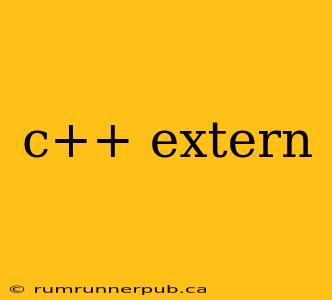The extern keyword in C++ is a powerful tool for managing the visibility and linkage of variables and functions across multiple source files. Understanding its nuances is crucial for building larger, more complex C++ projects. This article will explore extern through examples and explanations, drawing upon insights from Stack Overflow.
What is extern?
In essence, extern declares a variable or function that's defined elsewhere. It tells the compiler, "Hey, I'm going to use this thing, but it's not defined here; look for it during linking." This avoids redundant definitions and facilitates code modularity.
Example (Inspired by multiple Stack Overflow threads):
Let's say we have two files: my_functions.cpp and main.cpp.
my_functions.cpp:
#include <iostream>
int global_variable = 10; // Definition
void my_function() {
std::cout << "Global variable: " << global_variable << std::endl;
}
main.cpp:
#include <iostream>
//Declaration, not definition. Tells the compiler it exists elsewhere.
extern int global_variable;
extern void my_function();
int main() {
std::cout << "Global variable from main: " << global_variable << std::endl;
my_function();
return 0;
}
In main.cpp, extern int global_variable; declares that global_variable exists in another compilation unit (.cpp file). The compiler doesn't allocate memory for it here; it simply notes its existence and type. The linker then resolves this external reference by finding the definition in my_functions.cpp. The same principle applies to my_function().
Compilation and Linking:
To compile and link this code (assuming you're using g++), you would use a command similar to this:
g++ main.cpp my_functions.cpp -o myprogram
extern vs. static
A key contrast is with the static keyword. static limits the scope of a variable or function. A static variable within a function is only accessible within that function. A static variable at file scope is only accessible within that compilation unit. This contrasts sharply with extern, which explicitly enables access across compilation units. Consider this (based on common Stack Overflow questions about scope):
// file1.cpp
static int static_var = 20; // Only accessible within file1.cpp
// file2.cpp
extern int static_var; // This will result in a linker error!
extern and Header Files
It's best practice to declare externally linked variables and functions in header files (e.g., my_header.h). This promotes code organization and reusability.
my_header.h:
extern int global_variable;
extern void my_function();
Then, include this header file in both main.cpp and my_functions.cpp. This approach is cleaner and prevents inconsistencies in declarations.
Potential Pitfalls and Best Practices
-
Multiple Definitions: The most common error is defining the same
externvariable in multiple files. This leads to linker errors. Ensure that each variable or function declared withexternis defined exactly once in your project. -
Header File Inclusion: Carefully manage header file inclusions to prevent multiple definitions. Use header guards (
#ifndef,#define,#endif) in your header files. -
Namespace Considerations: If you're using namespaces, remember to qualify your
externdeclarations with the appropriate namespace. For example:extern namespace my_namespace { int my_variable; }.
By understanding the role of extern and following best practices, you can write more modular, maintainable, and efficient C++ programs. Remember to consult Stack Overflow (always properly attributing) for solutions to specific challenges and for community-driven insights. The information above is a synthesis of numerous Stack Overflow answers and offers an extended explanation beyond the typical short answers found on the site.
